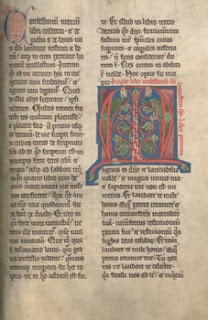(/ɔːˈɡʌstɨn/,[1] /əˈɡʌstɨn/,[2] or /'ɔːɡʌstɨn/;[3] Latin: Aurelius Augustinus Hipponensis;[note 1] 13 November 354 – 28 August 430), also known as Saint Augustine, Saint Austin,[4] (/ˈɔːstɨn/ or /ˈɑːstɨn/)[5] Blessed Augustine,[6] and the Doctor of Grace[7] (Latin: Doctor gratiae), was an early Christian theologian and philosopher[8]whose writings influenced the development of Western Christianity and Western philosophy. He was the bishop of Hippo Regius (modern-day Annaba, Algeria), located in Numidia (Roman province of Africa). He is viewed as one of the most important Church Fathers in Western Christianity for his writings in the Patristic Era. Among his most important works are The City of God and Confessions.
 |
| Saint Augustine from a 19th-century engraving |
Creation
In City of God, Augustine rejected both the immortality of the human race proposed by pagans, and contemporary ideas of ages (such as those of certain Greeks and Egyptians) that differed from the Church's sacred writings.[91] In The Literal Interpretation of Genesis, Augustine took the view that everything in the universe was created simultaneously by God, and not in seven calendar days like a literal interpretation of Genesis would require. He argued that the six-day structure of creation presented in the Book of Genesis represents a logical framework, rather than the passage of time in a physical way – it would bear a spiritual, rather than physical, meaning, which is no less literal. One reason for this interpretation is the passage in Sirach 18:1, creavit omnia simul ("He created all things at once"), which Augustine took as proof that the days of Genesis 1 had to be taken non-literally.[92] Augustine also does not envision original sin as causing structural changes in the universe, and even suggests that the bodies of Adam and Eve were already created mortal before the Fall.[93] Apart from his specific views, Augustine recognizes that the interpretation of the creation story is difficult, and remarks that we should be willing to change our mind about it as new information comes up.
 |
| Saint Augustine painting by Antonio Rodríguez |
Works
Augustine was one of the most prolific Latin authors in terms of surviving works, and the list of his works consists of more than one hundred separate titles.[155] They include apologetic works against the heresies of the Arians, Donatists, Manichaeans and Pelagians; texts on Christian doctrine, notably De Doctrina Christiana (On Christian Doctrine); exegetical works such as commentaries on Genesis, the Psalms and Paul's Letter to the Romans; many sermons and letters; and the Retractationes, a review of his earlier works which he wrote near the end of his life. Apart from those, Augustine is probably best known for his Confessions, which is a personal account of his earlier life, and for De civitate Dei (The City of God, consisting of 22 books), which he wrote to restore the confidence of his fellow Christians, which was badly shaken by the sack of Rome by the Visigoths in 410. His On the Trinity, in which he developed what has become known as the 'psychological analogy' of the Trinity, is also considered to be among his masterpieces, and arguably one of the greatest theological works of all time.[citation needed] He also wrote On Free Choice of the Will (De libero arbitrio), addressing why God gives humans free will that can be used for evil.
Confessions:
(Latin: Confessiones) is the name of an autobiographical work, consisting of 13 books, by St. Augustine of Hippo, written in Latin between AD 397 and 400.[1] The work outlines St. Augustine's sinful youth and his conversion to Christianity. Modern English translations of it are sometimes published under the title The Confessions of St. Augustine in order to distinguish the book from other books with similar titles. Its original title was Confessions in Thirteen Books, and it was composed to be read out loud with each book being a complete unit.
In the work St. Augustine writes about how much he regrets having led a sinful and immoral life. He discusses his regrets for following the Manichaean religion and believing in astrology. He writes about Nebridius's role in helping to persuade him that astrology was not only incorrect but evil, and St. Ambrose's role in his conversion to Christianity. The first nine books are autobiographical and the last four are commentary. He shows intense sorrow for his sexual sins, and writes on the importance of sexual morality. The books were written as prayers to God, thus the title, based on the Psalms of David; and it begins with "For Thou hast made us for Thyself and our hearts are restless till they rest in Thee."[3] The work is thought to be divisible into books which symbolize various aspects of the Trinity and trinitarian belief.



沒有留言:
張貼留言